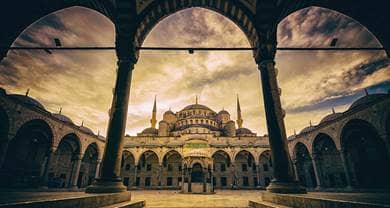- Trending:
- Pope Leo Xiv
- |
- Israel
- |
- Trump
- |
- Social Justice
- |
- Peace
- |
- Love

RELIGION LIBRARY
Sufism
Sacred Time
Sufism observes all of the same ritual prayers and holidays as mainstream Islam. As such, the five daily prayers, the holy month of Ramadan, and other major holidays (such as the Feast of the Sacrifice, which commemorates the sacrifice of the Patriarch Abraham) are part of the Sufi sacred calendar and daily routine.
For practitioners of Sufism, however, another dimension of time is expressed in a vocabulary of states and stations that one attains over the course of one's spiritual life. Each of these, a state or a station, has an additional temporal character, in that states are temporary, while stations are permanent.
A state, or hal in Arabic, is a part of a Sufi's spiritual path. A state is a transient spiritual condition, which comes upon a person or leaves a person with equal degrees of fleetingness. A state may be positive or negative; it may be a temporary sense of closeness to God that causes joy in the believer, or a sudden sense of distance from God, which causes a moment of grief or sorrow. According to leading scholar of Sufism, Seyyed Hossein Nasr, the Sufi disciple has a duty to persist through these transient states, and continue to practice in spite of the negative states as well as the positive ones. These moments are intricately connected to the spiritual life of the Sufi, whose attentiveness to the state of his or her interior life makes the experience of them a frequent occurrence. Their frequency is as importance as their impermanence—the states are meant to help the Sufi on the path, they are not a place in which to get stuck or fixate.
On the other hand, a condition known as a station, or a maqam, is more permanent. Seyyed Hossein Nasr likens them to plateaus reached during an ascent up a mountain, stations along the way to the top. A station is a high level of spiritual attainment. Other terms for these stations of spiritual awareness are manazil, or "places of descent," as in a place upon which something that is soaring temporarily alights, and mawaqif, standing points at which one pauses and stops. Stations may be linked to spiritual virtues, such as humility, charity, sincerity, or truthfulness.










